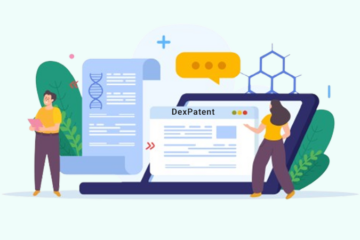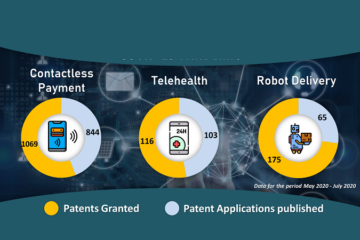Staying Ahead of the Curve with Patent Landscape

“Patent landscape analysis is a critical component of any business strategy in today’s technology-driven economy.” – Paul R. Michel, former Chief Judge of the U.S. Court of Appeals for the Federal Circuit.
Patents play a critical role in fostering innovations by providing incentives for investment in research and development, protecting innovations, and facilitating the transfer of technology and knowledge. This leads to the creation of new products, technologies, and processes. Patent landscaping stands as a potent tool, significantly enhancing the likelihood of a favorable outcome for businesses operating within technology-driven industries. Patent landscape analysis is conducted by business professionals, patent attorneys, and intellectual property professionals to gain a better understanding of the patents within a specific technology domain.
What is Patent Landscape analysis?
Patent landscape analysis provides an overarching perspective of patenting activities within a specific technology realm. This analysis involves searching, reviewing and mapping of the existing patents / patent applications and non-patent literatures in a specific field, and evaluates the strength, scope, and potential impact of these patents on the market. The main purpose of patent landscape analysis is to provide a comprehensive understanding of the patents and to identify potential opportunities, key players, technology trends and possible risks in the field.
Importance of patent landscape analysis:

Patent landscape analysis offers valuable insights into technology trends, competitors, and potential avenues for business growth and innovation. The output of a patent landscape analysis is typically a report that includes a visual representation of a summary of key findings, and recommendations for further action. Subsequently, this information can be utilized to formulate business strategies, make informed investment choices, and strategize research and development endeavours.
Conducting a patent landscape analysis is essential for businesses which are looking to stay ahead of competition and protecting their innovations.
Here are five reasons why your business should consider conducting a patent landscape analysis.
1.Identify emerging trends and opportunities:
One of the key aspects of patent landscape is to identify emerging trends and opportunities. It is imperative for every business to identify emerging trends and opportunities within their industry to maintain a competitive edge over rivals. Through monitoring the volume of patent filings within a specific technology over a defined timeframe, businesses can assess whether there exists a growing interest and substantial investment within that domain. This analysis provides information about changes in the market, which is critical for businesses to maintain a competitive edge and drive growth in the long run.
Few ways to identify emerging trends and opportunities:
- Track changes in evolution of technology
- Identify new players in the market
- Analyse R&D investments
- Identify collaborative opportunities
- Identify emerging markets
By doing so, businesses can stay ahead of the curve and capitalize on emerging opportunities before their competitors do, and identify new opportunities for growth, and make informed decisions about their intellectual property portfolio.
2. Assess the competitive insights:
Competitive insight is an integral part of patent landscape analysis. It is the process of gathering and analysing information about competitors which includes their strength, weakness in terms of patent holdings, and business strategies. This is accomplished by collecting and analysing the patent data for each of the identified competitors, including the number of patents they own, the types of patents they own, the dates of patent filings, and the countries where patents have been filed. Assessing these competitive insights data allows you to gain a comprehensive understanding of your competitors’ patent portfolios and strategic positioning in the market.
Steps to assess the competitive insights:
- Identify relevant competitors
- Collect & analyse patent data
- Identify white space opportunities
- Evaluate the competitor’s patent strength
- Monitor patent activity of competitors
Competitive insights help businesses to:
- Avoid infringement
- Evaluate the strengths of their own patent portfolio
- Identify potential areas of innovation
3. Enhance research and development (R&D) efforts:
By analysing patent documents, businesses gain insights into the current state of technology in a particular field and identify gaps in the market. Through pinpointing the technologies exhibiting the highest activity in patent filings and trends, businesses can enhance their comprehension of technological progressions, enabling strategic direction for their own research and development initiatives in areas with a heightened potential for yielding a return on investment. This information is used to enable them to stay ahead of competition and develop innovative products and services.

Patent landscape analysis is useful to enhance R&D efforts for businesses by:
- Identifying key players in a particular technology and analyse their patent portfolios for potential collaboration opportunities
- Discovering new technologies
- Identifying potential areas of competitive advantage
- Evaluating the patentability of their ideas by identifying existing patents and assessing the level of competition in the market, before investing significant resources into a new product or technology
- Informing strategic planning by identifying emerging trends and potential areas of growth
4. Develop a stronger patent portfolio:
Patent landscape analysis helps you to develop a stronger patent portfolio, by identifying new opportunities for innovation, avoiding infringement, prioritizing patent filings in areas where existing patents are weak or where there is a high level of competition, and identifying potential patenting opportunities as well as licensing opportunities. This information enables businesses to build a more robust patent portfolio, and gain a competitive advantage in their industry.
Developing a stronger patent portfolio provides several advantages to businesses, which include:
- Maintain market share and increase profitability in competitive advantage
- Increased market value by securing fund or attracting potential partners / buyers
- Revenue generation by licensing their technology to other companies or pursuing legal action against infringers
- Improved negotiation position with competitors or potential partners
- Increased innovation
“By conducting a thorough patent landscape analysis, businesses can gain a better understanding of the patent landscape in their industry and make more informed decisions about where to focus their resources.” – Deloitte
In the current fast-paced and intensely competitive business scenario, patent landscape analysis is an indispensable tool for businesses to stay ahead of the curve. Through conducting a comprehensive analysis of both granted and filed patents within their industry, businesses can attain a more profound comprehension of the competitive environment, prevailing technological trajectories, and viable licensing prospects. Armed with this knowledge, businesses can make more informed decisions about where to invest their resources, how to differentiate themselves from their competitors, and how to protect their intellectual property.
Key takeaways:
Patent landscape analysis serves as a guiding roadmap to success by illuminating the opportunities and challenges present within a specific technological domain. It empowers businesses to navigate this intricate terrain with assurance and a clear sense of direction. Therefore, if you aspire to outpace the competition and achieve success in the swiftly evolving business scenario of today, conducting a patent landscape analysis should be a paramount priority.











0 Comments